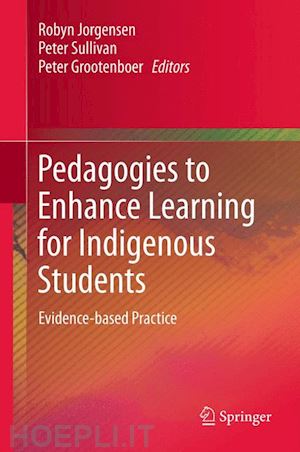
Questo prodotto usufruisce delle SPEDIZIONI GRATIS
selezionando l'opzione Corriere Veloce in fase di ordine.
Pagabile anche con Carta della cultura giovani e del merito, 18App Bonus Cultura e Carta del Docente
Foreword
Paul Hughes.-
Preface
Robyn Jorgensen, Peter Sullivan and Peter Grootenboer.-
Chapter 1: An Aboriginal perspective on education –Policy and practice
Dale Kerwin and Harry van Issum.-
Chapter 2: A systemic evidence-based strategy to improve Indigenous students’ numeracy and literacy
Thelma Perso.-
Chapter 3: Indigenous Education Workers: A special case of educational assistant
Bob Funnell.-
Chapter 4: Combating role discontinuity for principals of remote Indigenous schools
Richard Niesche.-
Chapter 5: Teacher s’ beliefs and practices in teaching mathematics in remote Aboriginal schools
Robyn Jorgensen, Peter Grootenboer and Richard Niesche .-
Chapter 6: Language for Learning in Indigenous Classrooms: Foundations for Literacy and Numeracy
Rod Gardner and Ilana Mushin.-
Chapter 7: Naming method: “This is it, maybe, but youshould talk to …”
Lisa Lunney-Borden and Dave Wagner.-
Chapter 8: A three-level intervention pedagogy to enhance the academic achievement of Indigenous students: Evidence from QuickSmart
John Pegg and Lorraine Graham.-
Chapter 9: Building confidence and fostering engagement in Aboriginal learners
Peter Sullivan and Niek van Riel.-
Chapter 10: Connecting children, community and curriculum
Jennifer Rennie.-
Chapter 11: Evaluating Indigenous science education programs: Applying the Ininiwi-kiskanitamowin Indigenous science education model to an informal education program
Dawn Sutherland and Natalie Swayze.-
Chapter 12: Using digital media to mediate learning in remote Aboriginal communities
Robyn Jorgensen.
Robyn Jorgensen is a Professor of Education at Griffith University. Her work has been predominantly in the area of mathematics education where she has been focused on understanding the ways in which practice includes or excludes particular groups of learners. She has worked across many Indigenous contexts, most recently spending 12 months in Central Australia, but also including work in the north-west of Australia and Queensland. She has an extensive publication record and is the recipient of numerous Australian Research Council grants.
Peter Grootenboer is Senior Lecturer in Mathematics Education at Griffith University. Peter worked in schools for 12 years as a teacher, senior teacher and Dean before moving into the tertiary sector. In 1997 he received a Jim Campbell Award – a national award for teaching excellence in mathematics in New Zealand. Peter completed his MEd and EdD through the University of Waikato focussing on mathematics education and educational leadership. Recently Peter’s research has focussed on Indigenous education, and issues related to equity and identity in mathematics learning and teaching.
Peter Sullivan is Professor of Science, Mathematics and Technology Education, Monash University. Peter is editor of the Journal of Mathematics Teacher Education, the leading international journal in the field. He was a member of the Executive of the International Group for the Psychology of Mathematics Education for four years. He is currently President of the Australian Association of Mathematics Teachers. Peter has established a reputation among researchers and practitioners for classroom research. His research on the use of open questions in mathematics classes has resulted in 4 books, 2 chapters in books, 12 refereed journal articles, 10 referred conference publications, and 5 research grants. He has also won competitive grants to conduct research on tasks generally, and processes for overcoming barriersto student learning.











Il sito utilizza cookie ed altri strumenti di tracciamento che raccolgono informazioni dal dispositivo dell’utente. Oltre ai cookie tecnici ed analitici aggregati, strettamente necessari per il funzionamento di questo sito web, previo consenso dell’utente possono essere installati cookie di profilazione e marketing e cookie dei social media. Cliccando su “Accetto tutti i cookie” saranno attivate tutte le categorie di cookie. Per accettare solo deterninate categorie di cookie, cliccare invece su “Impostazioni cookie”. Chiudendo il banner o continuando a navigare saranno installati solo cookie tecnici. Per maggiori dettagli, consultare la Cookie Policy.